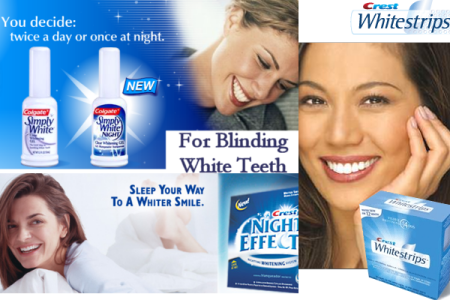November 25, 2003
Colgate vs. Crest: Round One in Fast-Growing Tooth-Whitener Market

I've always thought that "too white" look on a person's teeth was a real clue the person was posing hard, but apparently not everyone agrees with my specious opinion of teeth that glow in the dark.
Call it the "War of the Whiteners" - Colgate is suing P&G, joining a trend among P&G's consumer product competitors lately for "false advertising over ads that mention Colgate's Crest dental products, adding to a growing number of lawsuits as P&G mounts more aggressive ads that specifically target its rivals." Here's an excerpt:
-
Colgate-Palmolive Co. sued Procter & Gamble Co. Monday, alleging P&G is misleading consumers with new advertising comparing the companies' do-it-yourself tooth whitening products.
The federal suit accuses P&G of lying in commercials that say its Crest Night Effects and Crest Whitestrips products are "clinically proven" more effective than Colgate's Simply White Night and Simply White products.
New York-based Colgate also claims P&G used questionable measuring tactics to reach results showing its products make teeth several times whiter.
The suit, filed in U.S. District Court in Manhattan, seeks unspecified damages and asks a judge to order P&G to pull the advertising - including TV ads, newspaper inserts and cardboard coffee-cup holders.
Colgate claims the advertising risks "substantial and irreparable harm, including a loss of consumer confidence, loss of goodwill and lost sales, and could well destroy Colgate's tooth whitening business."
A spokeswoman for Cincinnati-based P&G did not immediately return a call for comment.
The two conglomerates are the nation's top two makers of tooth-whitening systems, which have gained popularity since hitting the U.S. market three years ago.
Here's another one:
-
Colgate on Monday filed the lawsuit in U.S. District Court in New York claiming that P&G advertisements for its Crest Whitestrips and Night Effects tooth whitening products put Colgate's Simply White products "in a bad light," a Colgate spokeswoman said on Tuesday.
The spokeswoman could provide no other details. A P&G spokesman said the claims made in its advertisements were accurate.
"We take great care to make sure that our advertising is accurate and supportable and we will vigorously defend our advertising," Bryan McCleary, a spokesman for Cincinnati-based P&G said.
While the lawsuits might in part be a strategy by competitors to defend their turf against new P&G products, they also could be the result of P&G being more aggressive in how it advertises, Joseph Altobello, analyst at CIBC World Markets, said.
"I think this is part of an ongoing strategy on the part of P&G to not only push the envelope on the part of some of their advertisements, put to also point out the differences between their products and those of some of their competitors," Altobello said of the advertising.
In May a federal jury awarded $2.96 million to Playtex Products Inc., maker of Tampax, after finding that P&G falsely advertised its new Pearl tampon.
In September, Johnson & Johnson-Merck, makers of Pepcid AC heartburn medication won an injunction that made P&G drop the slogan "one pill, 24 hours, zero heartburn" from ads for its Prilosec OTC heartburn medication. Johnson & Johnson Merck, a joint venture between drugmakers Merck & Co. Inc. and Johnson & Johnson, had argued that Prilosec OTC can take up to four days to take full effect.
The company also lost a lawsuit filed by Kimberly-Clark Corp. over an ad for Pampers diaper product that implied Kimberly-Clark's Huggies Pull-Ups could be removed by the toddlers wearing them. P&G also faces a lawsuit filed by Georgia-Pacific Corp. over ads that show P&G's Bounty paper towels absorbing more liquid than Georgia-Pacific's Brawny towels.
Companies in general have also been more willing to go to court lately to fight advertising disputes instead of through the National Advertising Division of the Better Business Bureaus, the industry self-regulator, Linda Goldstein, head of the advertising practice at lawfirm Manatt, Phelps & Phillips, said.
"I think in part that's a function of the market place and the competition becoming much more severe and much more aggressive," Goldstein said.
So, it seems the only way to compete with P&G in any market is to just sue 'em for false advertising... or maybe it's P&G that should reel-in its claims, unless it can prove their results... which so far, seems to trend toward doubtful.
- Arik
Posted by Arik Johnson at November 25, 2003 03:20 PM | TrackBack "Competitive Intelligence applies the lessons of competition and principles of intelligence to the need for every business to gain awareness and predictability of market risk and opportunity. By doing so, CI has the power to transform an enterprise from also-ran into a real winner, with agility enough to create and maintain sustainable competitive advantage."
"Competitive Intelligence applies the lessons of competition and principles of intelligence to the need for every business to gain awareness and predictability of market risk and opportunity. By doing so, CI has the power to transform an enterprise from also-ran into a real winner, with agility enough to create and maintain sustainable competitive advantage."
